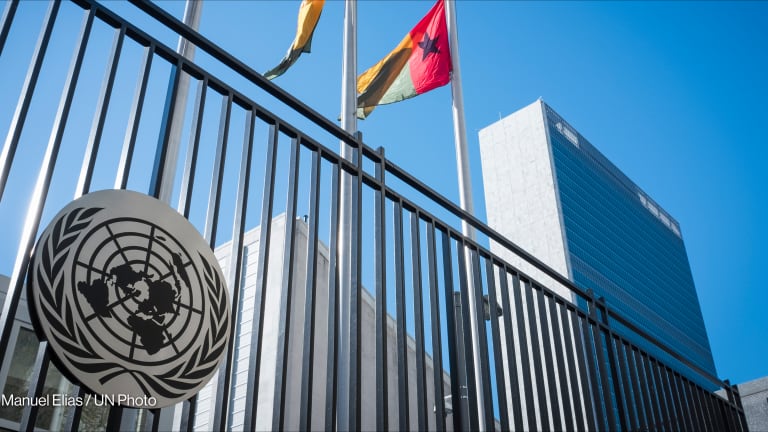Supporting excellence: How UNOPS' Grete Faremo plans to 'walk the talk'
Appointed by United Nations Secretary-General Ban Ki-moon in July, the new executive director of the U.N. Office for Project Services is determined to "walk the talk" of the agency's strategy. An exclusive interview with Grete Faremo.
As a leader, Grete Faremo focuses on supporting great people to affect change — no matter how small. Appointed by United Nations Secretary-General Ban Ki-moon in July, the new executive director of the U.N. Office for Project Services brings government as well as private sector experience to the operational arm of the U.N., which helps partners deliver approximately $1 billion worth of aid in development projects every year. “To me, it’s important to pick the right people, to motivate and to guide,” she told Devex of her leadership style at the Second Annual Career Development Roundtable in Oslo, Norway. Leaders must “walk the talk,” Faremo stated, and cited the agency’s goal of providing all staff — 7,000 personnel working in over 80 countries — with awareness that they need to adapt to wishes and requests from partners, but do so in a responsible and sustainable manner. Their efforts should add value for partners by anticipating, understanding and fulfilling their needs while at the same time advancing environmental, economic and social conditions within the communities they touch. Faremo pointed to the solar-powered lamps and mobile phone charging kits that UNOPS, in partnership with the U.N. Refugee Agency, has been able to deliver to internally displaced persons in Iraq. Displaced families are now linking these light-weight, portable and durable power sources together to enable TV capabilities, so “I hope you understand how we are able to create sustainable solutions that can add value,” she said. Learning from the past The former Norwegian minister of justice and public security acknowledged that UNOPS has adopted some very solid private sector principles as a fully self-financed organization and will continue to do so; but the agency was flailing in 2006, when the model was questioned due to failures in management controls, and personnel was anxious about their futures. “Many had left, many were leaving,” Faremo said. But the agency wrestled back control of the situation, and in 2009, management starting using the word “quality,” Faremo explained, to describe a new management system and strategic leadership program. “I think it’s very important that we are aware of our past — to be humble but ready to do great things,” she added. The agency’s current “excellence framework” involves developing organizational ability, managing with agility, harnessing creativity and innovation and succeeding through the talent of its people. Innovation doesn’t just apply to products and services, but also to processes, organizational design and attracting and retaining talent, Faremo said. Currently, they are seeking to improve collaboration and teamwork through investing in information technology, such as a new agency-wide resource planning system that will allow managers much more timely, accurate information about the organization to allow them to better implement strategic plans, collaborate with partners and deliver results. In order to ensure the agency recruits and retains leaders who can act as role models, Faremo, along with UNOPS’ executive board, places special emphasis on a leadership charter for both established and emerging leaders, outlining the values the organization expects them to embody. The idea is to create a culture of empowerment for achievement of both organizational and personal goals. As for Faremo’s personal goal: “I think UNOPS holds experiences and has made great achievements that should be better communicated, so I’ve taken it on as an important task for me to share more of that.” What priorities should Faremo set for her leadership at UNOPS? Let us know by leaving a comment below. Check out more stories on leadership and professional development online, and subscribe to Doing Good to receive top international development career and recruitment news.
As a leader, Grete Faremo focuses on supporting great people to affect change — no matter how small.
Appointed by United Nations Secretary-General Ban Ki-moon in July, the new executive director of the U.N. Office for Project Services brings government as well as private sector experience to the operational arm of the U.N., which helps partners deliver approximately $1 billion worth of aid in development projects every year.
“To me, it’s important to pick the right people, to motivate and to guide,” she told Devex of her leadership style at the Second Annual Career Development Roundtable in Oslo, Norway.
This story is forDevex Promembers
Unlock this story now with a 15-day free trial of Devex Pro.
With a Devex Pro subscription you'll get access to deeper analysis and exclusive insights from our reporters and analysts.
Start my free trialRequest a group subscription Printing articles to share with others is a breach of our terms and conditions and copyright policy. Please use the sharing options on the left side of the article. Devex Pro members may share up to 10 articles per month using the Pro share tool ( ).
Kelli Rogers has worked as an Associate Editor and Southeast Asia Correspondent for Devex, with a particular focus on gender. Prior to that, she reported on social and environmental issues from Nairobi, Kenya. Kelli holds a bachelor’s degree in journalism from the University of Missouri, and has reported from more than 20 countries.








